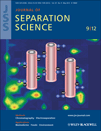
JOURNAL OF SEPARATION SCIENCE
Scope & Guideline
Pioneering Innovations in Analytical Chemistry
Introduction
Aims and Scopes
- Separation Techniques and Methodologies:
The journal covers a wide range of separation techniques, with a strong emphasis on chromatography and electrophoresis. This includes high-performance liquid chromatography (HPLC), capillary electrophoresis, and supercritical fluid chromatography, showcasing both fundamental research and practical applications. - Analytical Chemistry:
Research published in this journal frequently intersects with analytical chemistry, particularly in the development and optimization of methods for analyzing complex mixtures, including pharmaceuticals, environmental samples, and food products. - Biochemical Applications:
The journal explores the application of separation techniques in biochemical contexts, including the purification of biomolecules such as proteins, peptides, and nucleic acids, as well as the assessment of metabolic profiles in biological samples. - Green Chemistry and Sustainability:
A commitment to sustainability is evident in recent publications, with a focus on environmentally friendly extraction methods, use of green solvents, and the development of sustainable separation techniques. - Emerging Technologies:
The journal also highlights advancements in separation technologies, including the use of nanomaterials and novel stationary phases, as well as the integration of separation techniques with mass spectrometry for enhanced analytical capabilities.
Trending and Emerging
- Hybrid and Multi-Dimensional Approaches:
There is a rising trend in the use of hybrid and multi-dimensional separation techniques, which combine various methodologies to enhance the resolution and efficiency of separations. - Nanomaterials and Advanced Sorbents:
Research focusing on the application of nanomaterials and advanced sorbents in separation processes is gaining traction, highlighting their effectiveness in improving extraction and separation processes. - Eco-Friendly and Green Extraction Techniques:
A significant increase in publications addressing green chemistry principles in separation science, including the use of deep eutectic solvents and other sustainable practices, reflects a broader movement toward environmentally conscious research. - Integration with Mass Spectrometry:
The integration of chromatography with mass spectrometry continues to be a prominent trend, facilitating more comprehensive analyses and deeper insights into complex biological and environmental samples. - Metabolomics and Biochemical Profiling:
Emerging themes in metabolomics and the biochemical profiling of natural products indicate a growing interest in the application of separation science to understand complex biological systems and drug interactions.
Declining or Waning
- Traditional Separation Techniques:
There has been a noticeable decrease in publications focusing solely on traditional separation techniques without innovative modifications or applications. As newer technologies and methodologies emerge, traditional methods appear less frequently. - Single-Dimensional Chromatography:
Research that emphasizes single-dimensional chromatography techniques is declining in favor of multi-dimensional and hyphenated approaches that provide more comprehensive analysis capabilities. - Non-Sustainable Practices:
As the focus on sustainability in separation science grows, methods that do not adhere to environmentally friendly practices are becoming less prevalent in favor of greener, more efficient techniques.
Similar Journals

JOURNAL OF ANALYTICAL CHEMISTRY
Shaping the Future of Analytical PracticesJOURNAL OF ANALYTICAL CHEMISTRY, published by PLEIADES PUBLISHING INC, stands as a pivotal resource in the field of analytical chemistry, offering an innovative platform for researchers, professionals, and students to advance their knowledge and contribute to the discourse within the discipline. With an ISSN of 1061-9348 and an E-ISSN of 1608-3199, this journal features a focused exploration of analytical methodologies, instrumentation developments, and applications across various domains, contributing to practical and theoretical advancements in the field. Currently ranked in the Q3 category in Analytical Chemistry with a Scopus rank of #111 out of 156, it provides critical insights and innovation strategies for professionals aiming to enhance their analytical capabilities. Access to the journal is through standard subscription models, and it covers an extensive range of topics pertinent to the discipline from 1996 to 2024. Engage with the JOURNAL OF ANALYTICAL CHEMISTRY to be part of a vibrant research community dedicated to push the boundaries of analytical practices.

THEORETICAL FOUNDATIONS OF CHEMICAL ENGINEERING
Unveiling the Foundations of Chemical EngineeringTHEORETICAL FOUNDATIONS OF CHEMICAL ENGINEERING is an esteemed academic journal published by PLEIADES PUBLISHING INC, dedicated to advancing the field of chemical engineering and chemistry through rigorous theoretical discourse and scholarly communication. With a history of publication dating back to 1974, the journal has been a vital resource for researchers and professionals, contributing to the foundation of knowledge in this multidisciplinary domain. Although it does not offer open-access options, it remains an essential platform for innovative research, boasting a 2023 ranking in the Q3 quartile for both Chemical Engineering and General Chemistry categories. The journal is indexed in Scopus, where it ranks #210 out of 273 in Chemical Engineering and #317 out of 408 in Chemistry, emphasizing its growing relevance within the scholarly community. Researchers, educators, and students alike can benefit from the insights and findings shared within its pages, making it a critical venue for those seeking to enhance their expertise in theoretical chemical engineering.

CHROMATOGRAPHIA
Connecting Researchers to the Heart of ChromatographyCHROMATOGRAPHIA is a renowned scholarly journal published by Springer Heidelberg, specializing in the field of analytical chemistry, biochemistry, and organic chemistry since its inception in 1968. With its ISSN 0009-5893 and E-ISSN 1612-1112, the journal has maintained a robust profile, currently ranking in the Q3 and Q4 quartiles within significant Chemistry categories. Aimed at researchers, professionals, and students, CHROMATOGRAPHIA serves as a critical platform for disseminating innovative research, methodologies, and advancements related to chromatography and its applications in various scientific fields. While the journal is not open access, it offers significant visibility and scholarly contribution opportunities, making it an essential resource for those engaged in the vibrant intersection of chemistry and biochemistry.

Separations
Transforming Research into Practice in Separation ScienceSeparations is a prestigious open-access journal published by MDPI, dedicated to advancing the fields of analytical chemistry and filtration and separation processes. Established in 2014, the journal has swiftly emerged as a significant platform for disseminating groundbreaking research and innovative methodologies in separation science, boasting an impressive E-ISSN of 2297-8739 and operating out of Basel, Switzerland. With its focus rotating from 2016 through 2024, Separations has been categorized in the Q3 quartile for both analytical chemistry and filtration and separation disciplines as of 2023, demonstrating its relevance in these scientific areas. The journal's rankings in Scopus, with 93rd out of 156 in analytical chemistry and 15th out of 19 in chemical engineering filtration and separation, reflect its commitment to high-quality research accessible to a global audience. Researchers, professionals, and students will find valuable insights and pioneering findings that foster collaboration and innovation within the vibrant community of separation science.
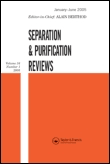
SEPARATION AND PURIFICATION REVIEWS
Unlocking New Horizons in Chemical EngineeringSEPARATION AND PURIFICATION REVIEWS, published by Taylor & Francis Inc, stands as a leading journal in the fields of Analytical Chemistry and Filtration and Separation, consistently recognized for its high impact and scholarly contributions. With an impressive impact factor reflected in its Q1 and Q2 quartile rankings, this journal serves as an essential platform for researchers, professionals, and students seeking to advance their knowledge and understanding of innovative methodologies in separation science. Covering a broad scope from 1972 to 1995 and from 2003 to 2024, the journal features peer-reviewed articles that influence critical advancements in chemical engineering and analytical techniques. SEPARATION AND PURIFICATION REVIEWS not only fosters collaboration among academics but also encourages discussions surrounding current challenges and innovations in separation processes. With its commitment to providing open access options, this journal ensures that essential findings are readily available to a global audience, thus driving forward the frontiers of separation science.
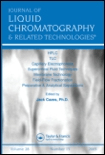
JOURNAL OF LIQUID CHROMATOGRAPHY & RELATED TECHNOLOGIES
Pioneering Techniques in Analytical ChemistryJOURNAL OF LIQUID CHROMATOGRAPHY & RELATED TECHNOLOGIES, published by Taylor & Francis Inc, is a pivotal platform for disseminating cutting-edge research in the field of liquid chromatography and its applications across various disciplines including analytical chemistry, biochemistry, and pharmaceutical science. With an ISSN of 1082-6076 and an E-ISSN of 1520-572X, this journal serves as an essential resource for researchers, professionals, and students committed to advancing the understanding and development of chromatographic techniques. Despite not being an open access publication, the journal features a robust submission process from 1996 to 2024, ensuring comprehensive coverage of historical and contemporary methodologies. Notably, it has achieved rankings in the Q3 and Q4 quartiles across various categories, reflecting its reputable position in the field. It’s recognized within key databases, with Scopus ranks indicating its influential role in areas such as pharmaceutical science and analytical chemistry. This journal is not only a cornerstone for specialized studies but also fosters interdisciplinary collaborations, making it an invaluable asset for the scientific community.
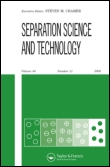
SEPARATION SCIENCE AND TECHNOLOGY
Transforming Insights into Practical ApplicationsSEPARATION SCIENCE AND TECHNOLOGY is a distinguished journal published by Taylor & Francis Inc, offering critical insights and advancements in the fields of chemistry and chemical engineering. With an ISSN of 0149-6395 and E-ISSN of 1520-5754, the journal spans a rich history from 1978 to 2024, providing a platform for scholarly articles that delve into innovative separation processes and technologies. Notably recognized in the 2023 category quartiles, the journal ranks Q2 in Chemical Engineering and Chemistry, alongside Q3 in Filtration and Separation and Process Chemistry and Technology, reflecting its significant impact and relevance in these research areas. With an impressive Scopus ranking, including a rank of #10/19 in Filtration and Separation, SEPARATION SCIENCE AND TECHNOLOGY is crucial for researchers and professionals seeking to enhance their understanding of separation techniques and applications. Although it operates under a subscription model, its contributions remain indispensable for the advancement of knowledge and technologies in separation science.
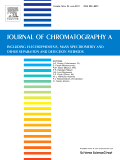
JOURNAL OF CHROMATOGRAPHY A
Leading the Charge in Chromatographic TechniquesJOURNAL OF CHROMATOGRAPHY A, published by Elsevier, is a leading journal in the disciplines of Analytical Chemistry, Biochemistry, and Organic Chemistry, boasting an impressive 2023 Q2 categorization across multiple fields. With an ISSN of 0021-9673 and an E-ISSN of 1873-3778, this prestigious journal has been at the forefront of chromatography research since its inception in 1958. The journal serves as a vital platform for disseminating high-quality research articles, reviews, and insights into the latest developments in chromatographic techniques and applications, reflecting its standing in the top tier of analytical and organic chemistry literature, evidenced by its impressive Scopus rankings. While it currently operates under a subscription model, the journal continues to make significant contributions to the scientific community by fostering collaboration and innovation in chromatography methodologies. We invite researchers, professionals, and students to engage with the essential findings shared within its pages, which are foundational for advancements in various scientific fields, making it an indispensable resource for enhancing chromatographic knowledge and practice.

CHINESE JOURNAL OF ANALYTICAL CHEMISTRY
Pioneering Innovations in Analytical TechniquesCHINESE JOURNAL OF ANALYTICAL CHEMISTRY, published by SCIENCE PRESS in China, stands as a prominent platform in the field of analytical chemistry since its inception in 1989. With its ISSN 0253-3820 and E-ISSN 1872-2040, the journal maintains a vital role in disseminating empirical research and innovative methodologies, contributing to the advancement of analytical techniques and their applications. The 2023 Scopus ranking positions the journal in the third quartile (Q3) within its category, reflecting a respectable standing among its peers. Researchers, professionals, and students alike engage with a broad range of topics, from instrumental analysis to environmental monitoring, each aiming to foster further scientific inquiry. Although it does not currently offer Open Access, the journal's rich repository of knowledge continues to be an essential resource for those in the analytical chemistry community, with an enduring commitment to scientific excellence and collaboration.

SEPARATION AND PURIFICATION TECHNOLOGY
Pioneering research in separation and purification technologies.SEPARATION AND PURIFICATION TECHNOLOGY is a leading multidisciplinary journal published by Elsevier, focused on advancing the fields of Analytical Chemistry and Filtration and Separation. With its ISSN 1383-5866 and E-ISSN 1873-3794, this prestigious journal has achieved remarkable recognition, ranking in the top quartile (Q1) in both its categories, reflecting its substantial impact and relevance in the scientific community. Operating from its headquarters in Amsterdam, Netherlands, SEPARATION AND PURIFICATION TECHNOLOGY serves as a vital platform for researchers, professionals, and students to disseminate innovative findings and methodologies related to separation processes and purification techniques. The journal not only promotes open access research but also maintains a rigorous peer-review process to ensure high-quality publications. With a convergence period spanning from 1997 to 2025, it highlights the ongoing evolution and importance of separation technology in various applications, establishing it as an essential resource for those interested in cutting-edge advancements in analytical and chemical engineering domains.